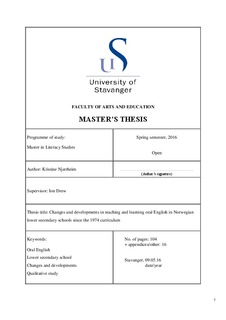| dc.contributor.advisor | Drew, Ion | |
| dc.contributor.author | Njærheim, Kristine | |
| dc.coverage.spatial | Norway | nb_NO |
| dc.date.accessioned | 2016-08-22T10:54:51Z | |
| dc.date.available | 2016-08-22T10:54:51Z | |
| dc.date.issued | 2016-05 | |
| dc.identifier.uri | http://hdl.handle.net/11250/2400319 | |
| dc.description | Master's thesis in literacy studies. | nb_NO |
| dc.description.abstract | This thesis focuses on the teaching of oral English in Norwegian lower secondary schools since the M74 curriculum to the present. The main research question of this thesis was: ‘How has the teaching of oral English in the Norwegian lower secondary school changed and developed since the 1974 curriculum?’ The thesis also addressed the following two additional research questions: ‘How did the teachers teach oral English in each curriculum period?’ and ‘How did the learners experience the teaching of oral English in each curriculum period?’ The study was conducted mainly through semi-structured interviews. Four teachers and four former pupils were interviewed, one teacher and one former pupil representing each of the curriculum periods. To gain an even broader understanding of how teachers had taught and how pupils had experienced oral English teaching in the lower secondary school since 1974, oral activities in textbook materials from each curriculum period were also analysed. The review of the M74, M87, L97 and LK06 curricula showed that the focus on oral skills and oral communication had increased since M74. The analysis of the textbooks showed the same trend. The interviews conducted with the teachers indicated that the number of different oral activities used by the teachers in the EFL classroom had increased over the years. However, the picture portrayed of oral classroom English by the teacher and former pupil in a given period did not always concur. One oral activity that was heavily discussed and criticised was reading aloud in class. Despite the criticism of the activity, it still seems to be part of English lessons in lower secondary schools. How teachers’ set pupils’ oral English grades in the four curriculum periods also indicate a large change. It seems that the basis for assessing pupils’ oral skills has changed from being very thin to focusing on several oral presentations. However, that most teachers might set pupils’ oral grades on the basis of a presentation is somewhat worrying as this is not the best method of assessing pupils’ communicative skills, which have gradually been emphasised more in the English subject curricula. The findings also indicate that the teachers’ use of English in the classroom had increased during the curriculum periods. Although this research has shown many indicators of pupils today (through the sample interviewees and analysis of textbook materials) being better oral English speakers than in the previous curriculum periods, their attitudes toward the English subject do not seem to have changed. The sample revealed that it still seems to be as challenging to get pupils to be orally active in the EFL classroom as it was during the M74 curriculum period. The English subject is in danger of losing its status and there needs to be a focus on enhancing the subject’s reputation and importance. The subject
iii
also seems to be undermined by social studies becoming a large part of it, in addition to pupils learning a good deal of their oral English outside of school through English-mediated activities. As most Norwegians are in need of a high level of oral English proficiency, it is of the utmost importance for young Norwegian learners to acquire good English oral skills. It is therefore important to contribute to this field of research. This thesis has contributed to the limited research available on the field of oral English and in a (historical) way which, as far as the researcher is aware, has not been conducted before. | nb_NO |
| dc.language.iso | eng | nb_NO |
| dc.publisher | University of Stavanger, Norway | nb_NO |
| dc.relation.ispartofseries | Masteroppgave/UIS-HF-IKS/2016; | |
| dc.subject | utdanningsvitenskap | nb_NO |
| dc.subject | spoken English | nb_NO |
| dc.subject | lower secondary school | nb_NO |
| dc.subject | changes and developments | nb_NO |
| dc.subject | qualitative stud | nb_NO |
| dc.subject | literacy studies | nb_NO |
| dc.subject | engelskopplæring | nb_NO |
| dc.title | Changes and developments in teaching and learning oral English in Norwegian lower secondary schools since the 1974 curriculum | nb_NO |
| dc.type | Master thesis | nb_NO |
| dc.rights.holder | Kristine Njærheim | nb_NO |
| dc.subject.nsi | VDP::Humanities: 000::Literary disciplines: 040::General literary science: 041 | nb_NO |
| dc.source.pagenumber | 120 | nb_NO |
